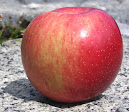
|
| Fisticuffs! (Public domain image) |
In the 19th Century no less than seven New England communities professed to be the one true home of the original Baldwin apple tree.
The Town of Baldwin, Maine, and the Massachusetts communities of Billerica, Burlington, Medford, Tewkesbury, Wilmington, and Somerville, all claimed the Baldwin as their own.
The dispute was a prelude to the heated disagreement over the proper wording for the inscription of the Baldwin Apple Monument.
The competing claims were explored in "The Baldwin Apple" by the Rev. Leander Thompson, published in the 16th Annual Report of the New Hampshire Board of Agriculture (1888, 301–320).

|
| Baldwin |
Baldwin was a preeminent apple of the day, an important crop esteemed in a way that scarcely seems possible for an apple nowadays. (Sorry, Honeycrisp.)
Baldwin retained its position as the definitive New England apple until the 1930s, when severe winters killed the trees. Farmers turned to a cold-hardy variety from Ontario called McIntosh.
To Thompson, and to others since, the weight of evidence comes down squarely in favor of the claim of the Town of Wilmington.
Wilmington's claim
It was "discovered" and brought to the attention of Col. Loammi Baldwin in 1793 during the course of survey work for the Middlesex Canal near the farm.
(The apple was already known locally as the Peckers apple, after the woodpeckers that frequented the tree. Baldwin was the chief engineer for the canal.)
Rev. Thompson considered letters and other materials that also describe how the apple was spread in the early days.
These documents express the spirit of the times and show the earnestness with which such matters were considered.
 |
By 1895 the question of the mother tree's location was settled enough that the Rumford Historical Society erected a granite monument to the apple by Butters Farm in Wilmington. (Or perhaps the Society built the Apple precisely to settle Wilmington's claim in the public imagination.)
Other burning issues about the apple and the monument, however, persisted.
Oh, those hot-blooded Victorians! and their passion for apples.

Great story. I can see it now: "Pippins at dawn, gentlemen. Turn, take ten paces and then let your fruit fly!" :)
ReplyDelete